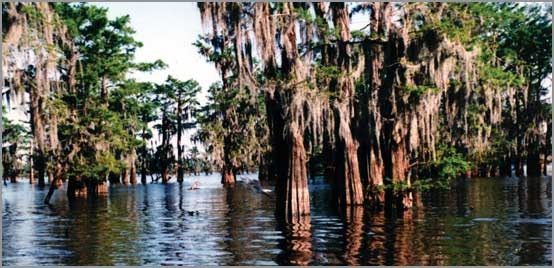
| Route 66 | Cities | Beaches |
 |
Barren |
Blue |
Miami |
Nolin |
| Atchafalaya | Big Dismal | Boundary Waters | Everglades | Okeefenokee | Pascagoula | Suwanee |
| Possibly the best kept secret in America is the Pascagoula River Basin in Mississippi. Extending from the Northeast corner of Mississippi south through the Eastern side until it empties into the Gulf of Mexico, the Pascagoula is one of the nation's great river systems. It is the longest river in all of North America still without a single dam, channel, road crossing, irrigation diversion ditch, pumping station, town, or even so much as a resort development along its shores. There no oil derricks, dredging barges, marinas, fishing camps, or water purification plants. Because it's shallow and often narrow with submerged trees and sandbars, yachts and powerboats cannot navigate it. It is an absolutely untouched river. The surrounding wetlands make hiking and backpacking trails impossible. The only way to see the Pascagoula is to canoe or kayak or johnboat it. The meandering channels have very little current. Even for experienced paddlers pushing straight down the river with very few stops, the fastest descents have taken five days and four nights. | 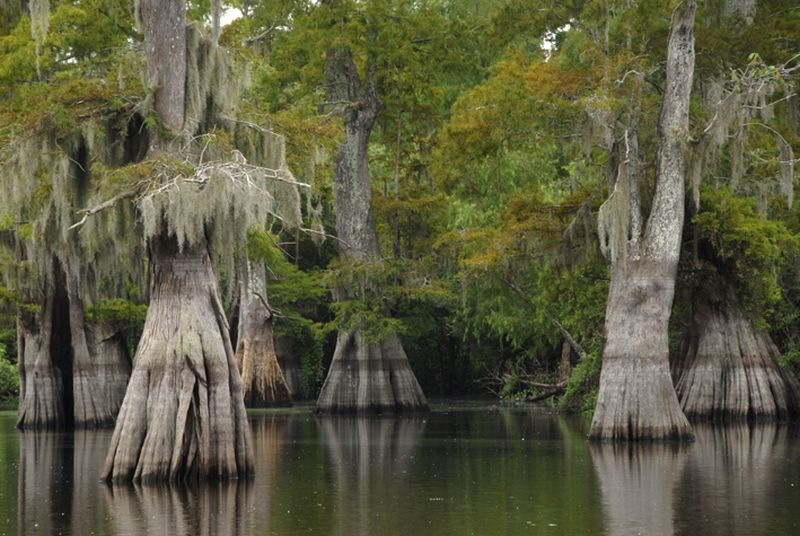 |
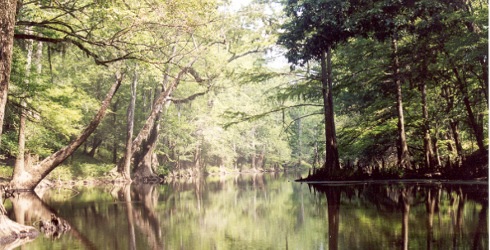 |
Because those meandering channels create a confusing and ever changing spider web of side streams, we highly recommend using a local guide service. We recommend you call Captain Kathy Wilkinson at EcoTours Of The South, at 228-297-8687. Her company runs Pascagoula River tours year round. Their headquarters is at Gautier, just off Interstate 90, where the Pascagoula flows under the highway and then empties into the Gulf of Mexico. They offer one and two hour, half day and all day pontoon boat tours of the lower basin, but with advance notice they can set you up with a guide and a five day trip. Ask for canoes. On several consecutive all day paddles, the ability to alternate kneeling and sitting positions is invaluable. Canoes also have much more room for packing. One of the huge advantages in going with EcoTours is that they provide the shuttle to your launch site. Setting up your own shuttle far from home is always awkward. |
Whether you go with Kathy Wilkinson or make your own arrangements, the traditional launching point is at Lucedale, a village where the Leaf and Chickasawhay Rivers merge to form the Pascagoula. This sets up the classic five day, four night descent. If you wanted a longer trip, you could launch further up one of the tributaries. For a classic two week trip, you could launch at either Hattiesburg and come down the Leaf River, or at Meridian and come down the Chickasawhay. Those two rivers are more civilized than the Pascagoula. You'll pass farms, roads, villages and commercial establishments. Once you pass Lucedale, you'll descend into the wilderness the Pascagoula's famous for. Assume your cell phones, IPads and laptops will be out of range from Lucedale to Gautier. It's possible you might get a signal but don't count on it. We highly recommend Fall or Spring, especially October or April, for this trip. You avoid the bugs, humidity, heat and crowds. It's also easier for EcoTours to free a guide for five days. During the Summers, they're often booked solid with day trippers. There's no whitewater on the Pascagoula. Unless you follow a heavy rain, the current is slow. We suggest you equip your canoe with very nice seat backs so you can lean back. Fishermen often go to the extreme of installing swivelling captains' chairs with arms. To do that you remove the stock seats, replace them with solid wood slabs, and attach the swivel seats to those. |
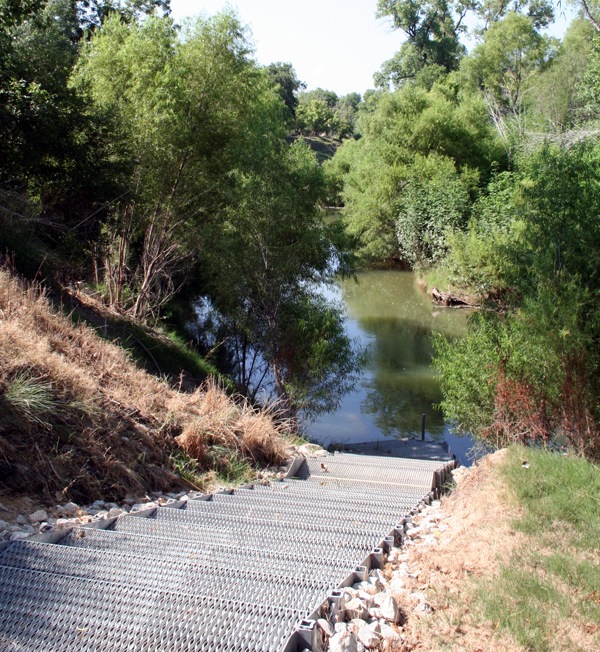 |
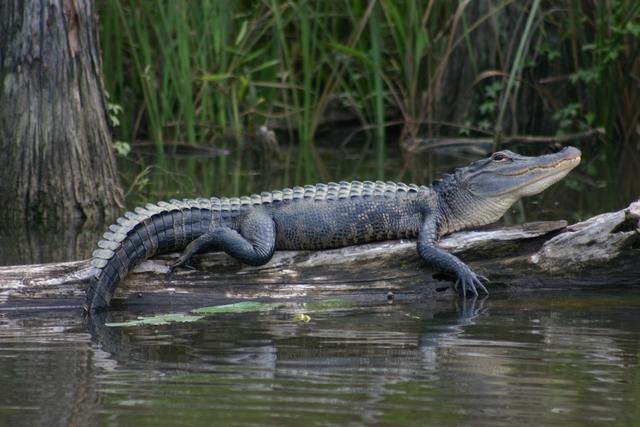 |
Yes, Alligators will be an issue. An adult male alligator can weigh 792 pounds and be 13.5 feet long. Some stretches of the river are free of them, but others are heavily populated. If you tent camp in a gator zone, rangers suggest pitching your tent at least 150 feet from the water and avoid the sandbars (Alligators are clumsy on land and prefer not to stray too far from water). Ideally you can find a steep bluff several feet above the water, since Alligators cannot climb. . You are advised not to even bring your dog, as he would be at significant risk. Some veteran Pascagoula paddlers prefer camping hammocks to tents, as the hammocks suspend you above ground. Alligators can leap out of water but cannot leap at all from land. Hammocks also keep sand out and are bug screened, so have multiple advantages. Because of the Alligators, you should not go swimming and should not trail hands or feet from your canoe or kayak while drifting on the water. However, all this said, Alligators are not a major problem. They are not aggressive. They approach paddlers more out of curioisity than hunger. And another reason for using a guide is they know where Alligators are a threat and where you can relax and not worry about them. |
| The Pascagoula is a fisherman's paradise. Shown here is the Gulf Sturgeon. They live their adult lives in The Gulf of Mexico but, like Salmon, return to freshwater to lay their eggs. Sturgeon are prehistoric. Like Sharks, they have no bones. They have cartilege, a primitive version of bone. Unlike Sharks, Sturgeon are bottom feeders, cruising along in search of crabs, clams, and other benthic organisms. This makes them similar to Catfish. On the surface, instead of scales, Sturgeon have hard bony armored plates. This makes them similar to Muskellunge. There are other species of Sturgeon around the world. Gulf Sturgeon were hit hard by hurricanes Katrina and Rita, then staggered by the Deepwater Oil Spill. Since Sturgeon are bottom feeders, the millions of gallons of oil which settled over the bottom of the Gulf was a disaster. They still return to the Pascagoula each year, but their numbers are way down. | 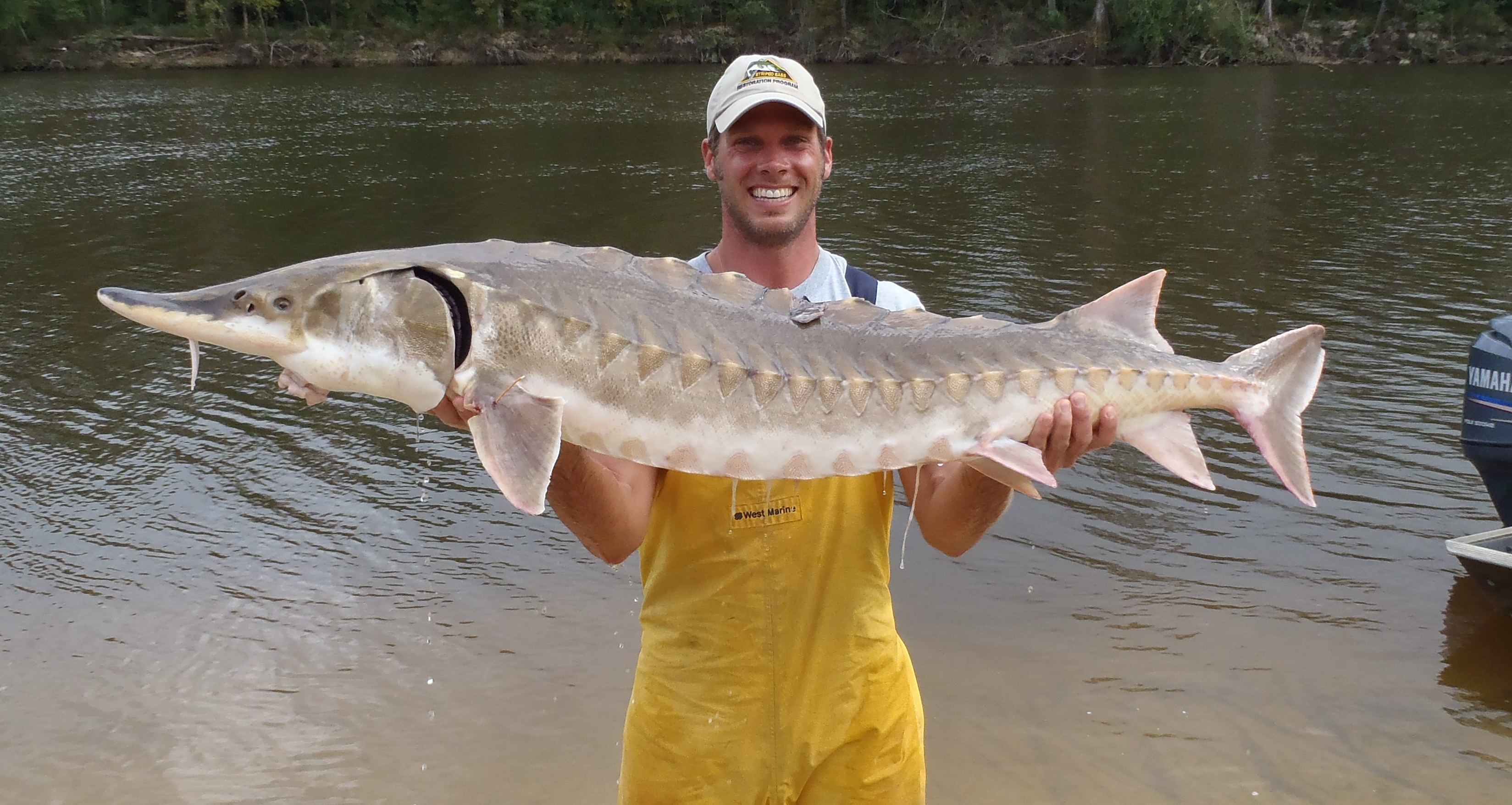 |
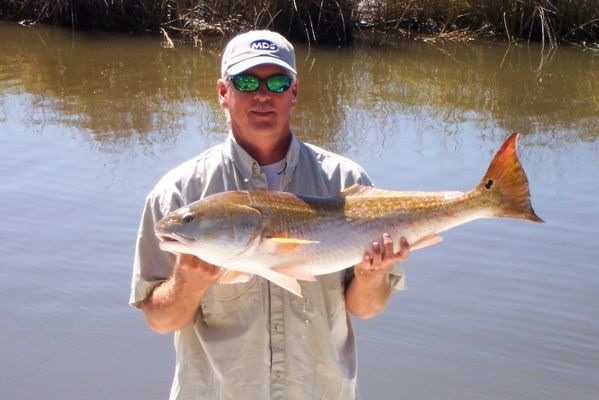 |
If you're not quite ready to haul in an eight foot long, 200 pound Sturgeon, you can settle for the dozen kinds of smaller but still delicious fish which live in the Pascagoula. These include Largemouth Bass, Catfish, Bluegill, Croppie, Shellcracker, Sunfish, Goggle Eye, Grennel, Pickerel, Sunfish, Gar, Flathead, Bream and Carp. This is another reason why going with a guide is advisable. They know where the fish are, have the appropriate equipment, and know what baits to use. Don't forget you need a state fishing license. EcoTours can handle that for you. If you go on your own, you can buy one in Luceville or Gautier. |
| Famous Mississippi novelist William Faulkner wrote his novel The Bear about a hunting trip in the Pascagoula Wilderness. And the bears are still here. As a matter of fact, there are two kinds of bears here: Mississippi Black Bears, and Louisiana Black Bears. Mississippi Black Bears are slightly smaller, with a white blaze on their chests and a brown nose. The Louisiana Black Bears have a solid black muzzle and no white blaze, in addition to being slightly larger. These bears were considered endangered back in the 1980s, and hunting them was suspended. Their populations have now increased to the point they are no longer considered threatened. Wildlife biologists estimate there are 60 adult males living along the Pascagoula River, with an unknown number of females and cubs. Black Bears are not like Grizzlies. They're not aggressive. Pascagoula Bears live very well. They have a rich diet which is about 90% fruits, berries, roots, grass and bark and 10% fish and small game. They don't need additional snacks so they're not snooping around campsites for food. They're just watching you paddle by with a sense of curiosity. They're also shy. If you see one on shore and try to paddle over for a closer look, they'll drop to the ground and disappear into the forest. | 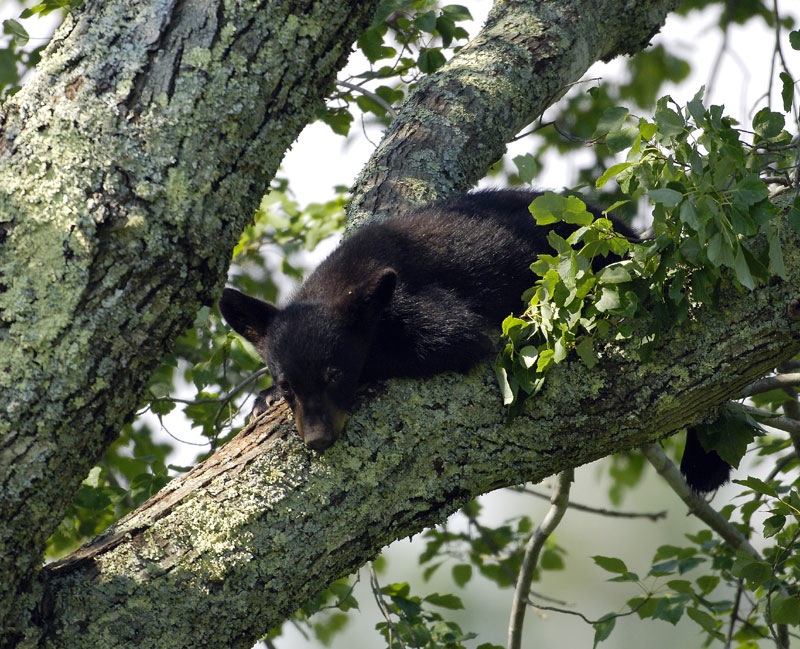 |
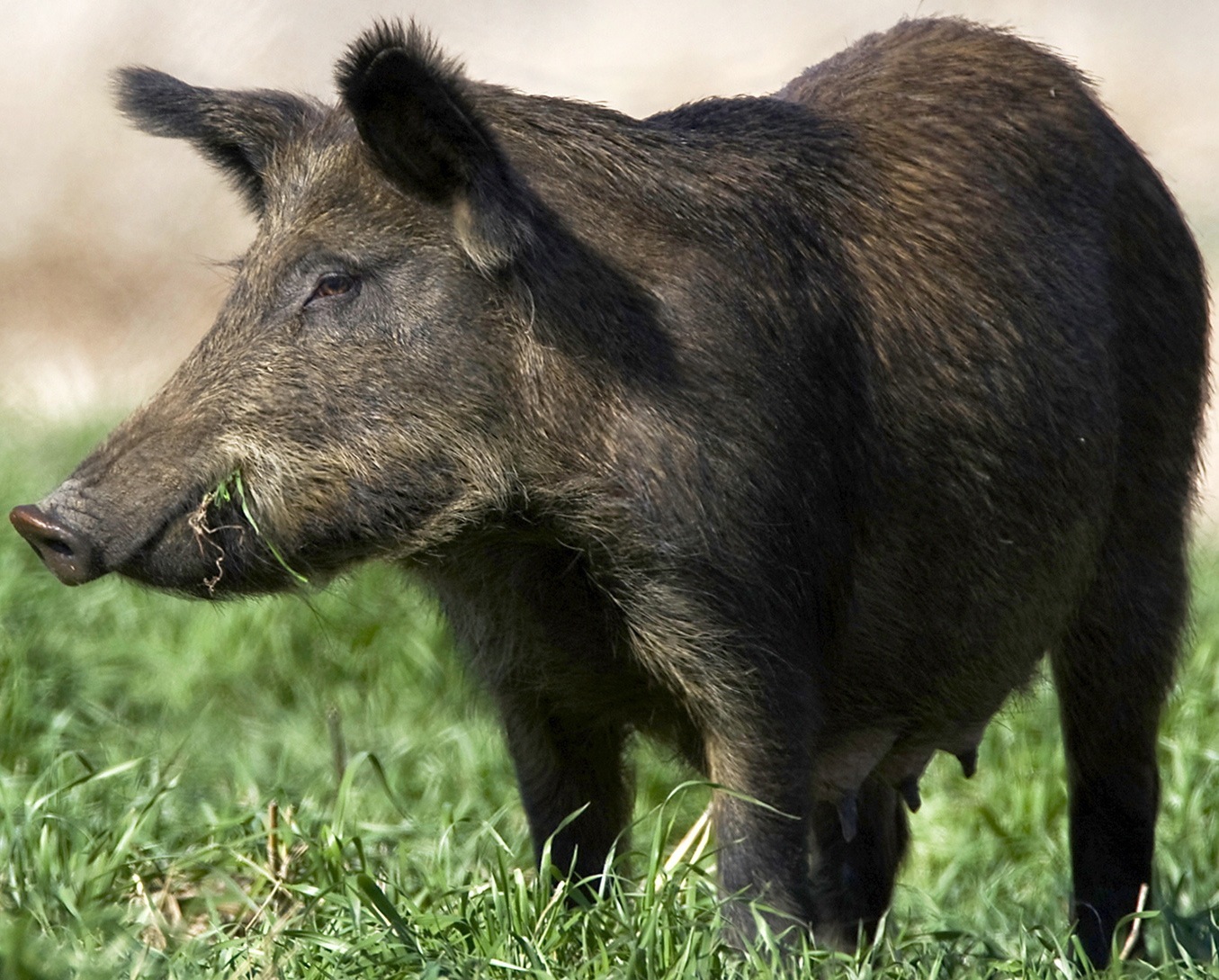 |
One of the more interesting inhabitants of the Pascagoula Basin is the Mississippi Wild Hog. A cousin of the Arkansas Razorback Hog, these are free ranging pigs. They're smart, clever and aggressive if cornered. Unlike domestic pigs, they're not overweight, but instead are very muscular. Mississippi offers Hog Season and issues Hog Hunting Permits. Wild Hogs sleep all day and come out at sundown. They spend all night foraging by rooting in the soil for roots, grubs, nuts, berries, etc. About 20% of their diet is animal prey, mostly mice, moles or other mammals they find under ground. They won't come into your camp, but if you see or hear them rooting around in the vacinity, do not approach them for a good look or a picture, because they have a mean streak and will charge. A wild hog has very strong jaw muscles and can easily bite through bones. Far from being endangered, their population is increasing. They have almost no predators except human hunters. A typical female lives eight year and produces a litter a year, with 5-6 piglets per litter. An adult wild hog weighs from 200-300 pounds. They can run at speeds up to 30 mph and can jump over fences, rocks or fallen trees up to four feet high. Animal behavior specialists rank them among the most intelligent of all wild mammals. |
| The most beloved resident of the Lower Pascagoula is the Manatee. These huge gentle beasts have a great sense of curiosity and will come right up to your canoe, kayak or johnboat for a closer look and often swim along with you for a mile or so. They're vegetarians so are no threat despite their size. If you move slowly, they will usually let you pet them. Technically, these are West Indian Manatees, who migrate South to the Carribbean in the Winter and return to Mississippi and Alabama in the Spring, Summer and early Fall. Adult Manatees are about 13 feet along and weigh about 1300 pounds. They have a 60 year lifespan. Animal behavior specialists have found them to be extremely intelligent, with great long term memory, great associative learning and great problem solving skills. They swim at about 5 mph. Although they use their flippers primarily for swimming, they will walk along the bottom as they graze on seaweed and other aquatic plants. The Manatee is like Whales and Porpoises, one time land mammals who returned to the oceans and devolved their arms and legs to flippers for swimming. | 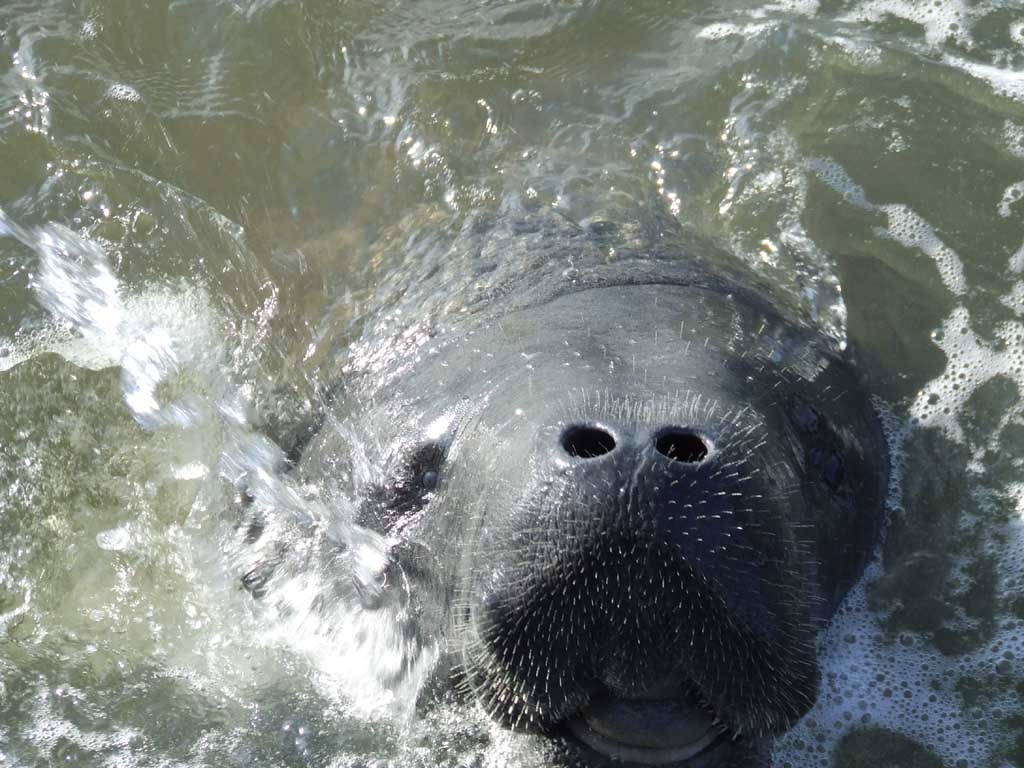 |
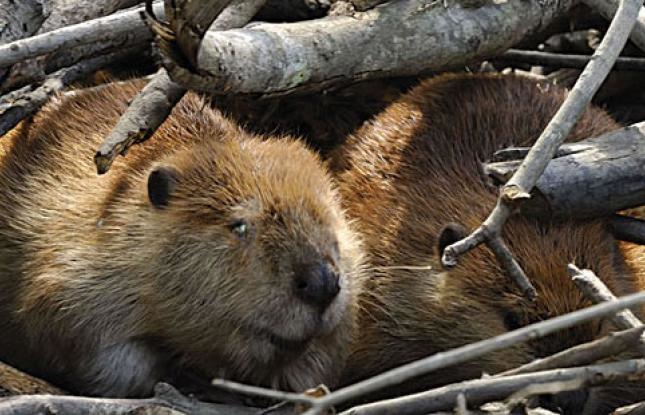 |
The invader of the Pascagoula River is the Nutria, basically an aquatic rat which migrated north from South America. Many paddlers think they're seeing Beaver or Muskrat, but a closer look will reveal the short, round Nutria tail. People have tried to find economic uses for Nutria without much success. They do produce meat, but humans have never liked the taste. Some entrepreneurs have tried producing Nutria meat dog food without success. And Nutria are a problem. They gnaw down trees, blocking rivers and trails. They compete with other animals for forage. And they kill fish. One controlling factor is cold. Nutria cannot handle cold. A long, cold Winter will eliminate them from an ecosystem until they gradually repopulate it over several warmer years. Nutria can annoy paddlers as they sneak into camp at night at gnaw on boots and paddles for the salt from perspiration. This destroys the boots and paddles. |
| The mystery animalof the Pascagoula is the Black Panther. Very reclusive, you are more likely to see its footprints, or hear its cry at night, then you are to see one. They're nocturnal, they avoid people, and they move in the shadows. Some locals think these may be part of the Florida Panther population which somehow migrated along the Gulf Coast in search of better habitat, as human development closes in on the Everglades. Wildlife Biologists deny this, arguing that it would be impossivle for Panthers, however stealthy, to move along the heavily populated Florida and Alabama coasts. Many biologists suggest these may not be Panthers at all but Ocelots or Jaguars with a melanin mutation giving them their black color. Ecologists theorize the Black Panthers, Ocelots or Jaguars, whatever they are, may be instrumental in keeping the Nutria and Wild Hog populations under control. No one knows how many of these secretive cats are out there. | 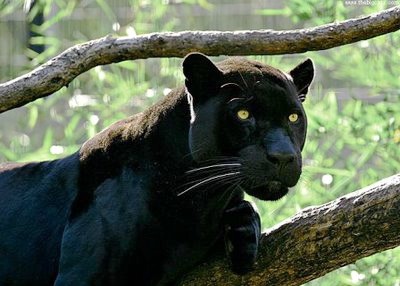 |
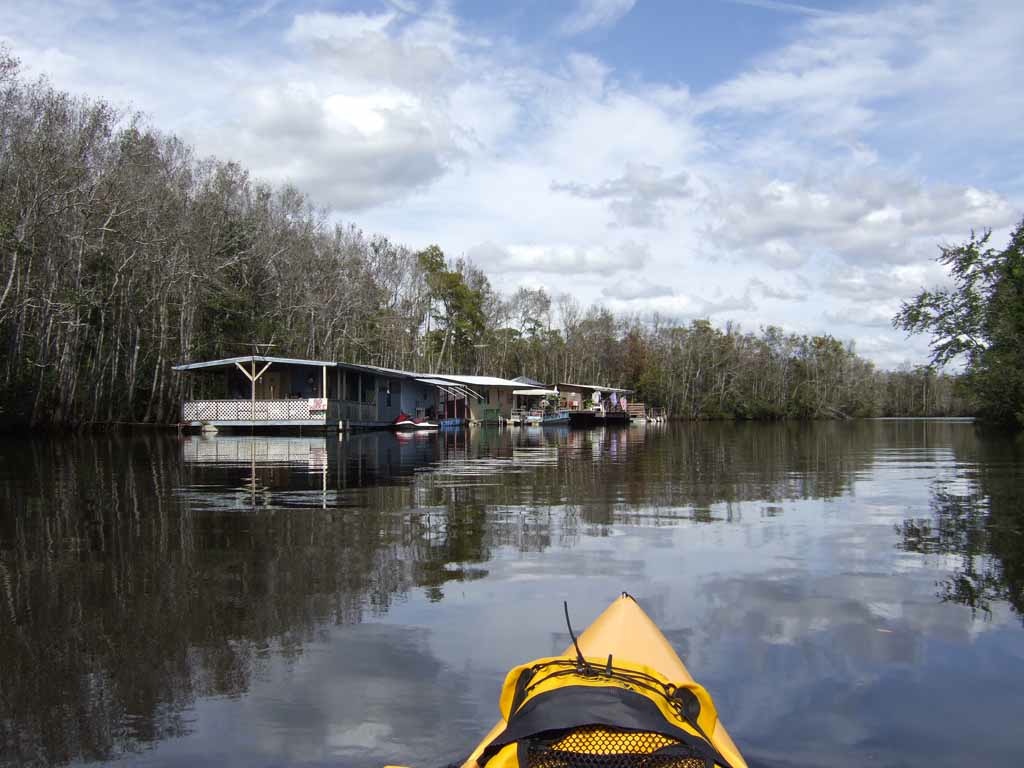 |
Periodically, in some isolated section of the Pascagoula, you'll come to a houseboat or several of them lashed together. These are not fishing, hunting or vacation retreats. They're permanent residences. The recluses living out here have turned their backs on civilization. They hunt, fish and trap. They take a johnboat into Gautier for groceries. They either go to bed at dark, or use solar panels for electricity. They're off the grid. They don't pay taxes, utilities or permit fees. Some of them have college educations and had profitable careers, then retired out here. Some of them are high school dropouts who never bothered fitting into civilization. Some paint, or write, or carve, creating Pascagoula Art. Some make a seasonal income as hunting or fishing guides. All of them share a lifestyle which is completely foreign to most Americans. |
| If you're looking for a place to get away from civilization, the Pascagoula is it. Once you're 20 minutes downriver from Luceville, until you approach Gautier five days later, you won't hear a car, stereo, chain saw, motorboat, airplane or any other mechanical noise. You're in a de facto wilderness. It's not even a national park. There's no lodge, no walkways, no signs, no maintained campgrounds. If you get in trouble, your cell phone won't bring help. If your canteen runs out of water, you'll have to purify more. If your stove runs out of fuel, you'll have to live on cold cereal. It's just you and your guide and the river. | 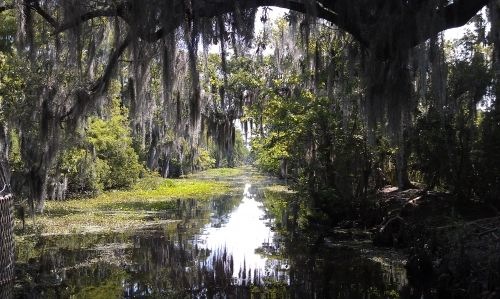 |
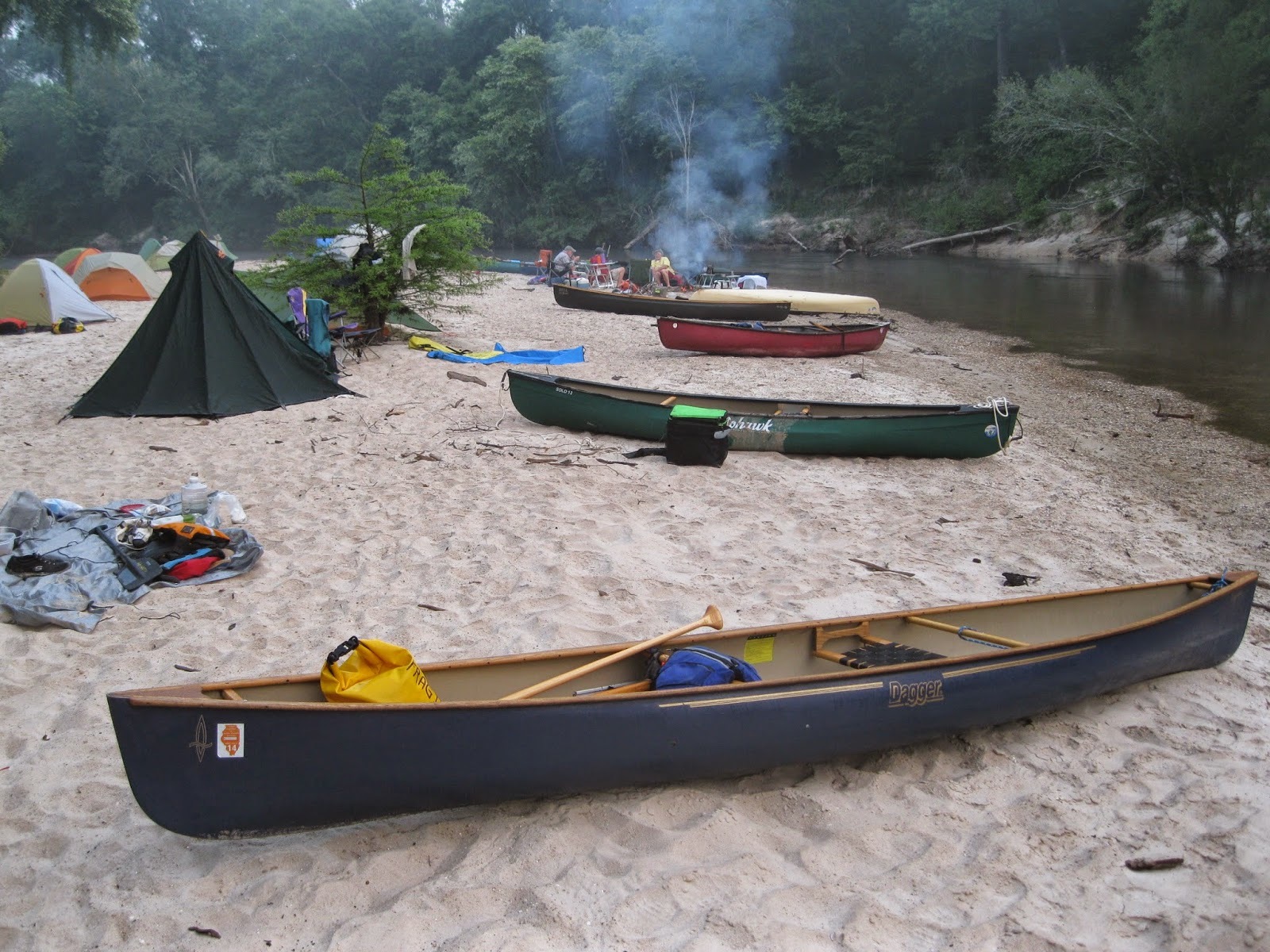 |
Every couple of hours paddling down the Pascagoula, you come to a beautiful sandbar campsite in an area free of Alligators. So you can pitch your tent close to the water, relax with a nice swim, and stretch out on the warm soft sand for a great night's sleep. These sites tend to fill up with paddlers. Notice how all these people have canoes, not kayaks. |
| Turtles get pretty big along the Pascagoula. This is a reptile lover's Paradise. Turtles, Snakes, Toads, Frogs, Lizards and Salamanders all thrive here. There's lots of food, the temperatures never get really cold and when they do chill down they warm back up pretty fast. | 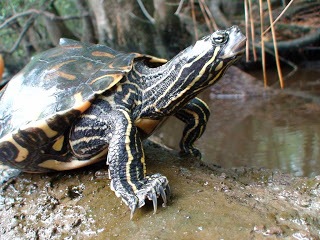 |
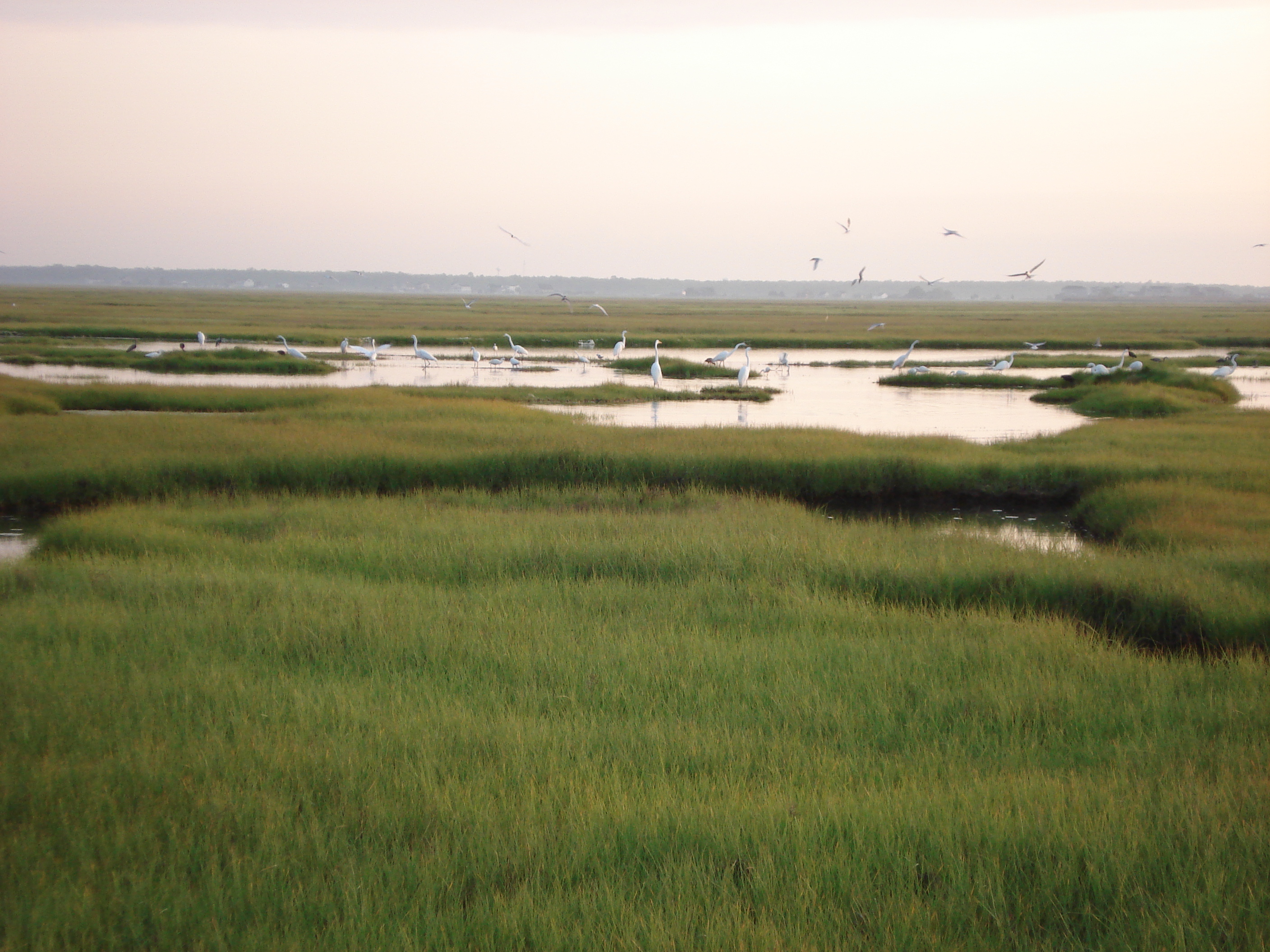 |
As it approaches Gautier, the Pascagoula widens out and shallows up into a classic salt marsh. Channels meander through a grass wilderness. Birds are everywhere, feeding on the plentiful fish. The towns of Gautier, Moss Point and Pascagoula border on this marsh. Interstate 10 is really the southern boundary of the river as we love it. As the river empties into the Gulf of Mexico, it becomes very busy, with fishing boats, U.S. Navy and Coast Guard vessels, powerboats, and commercial estasblishments lining the shores. However, Pascagoula does offer hotels like the Holiday Inn Express (just south of I-10) and a dozen good restaurants. After five days on the river, it's nice to enjoy these amenities before heading back up I-65 toward Kentucky and the Ohio Valley. If you can afford a few extra days, you can go out on one of the charter boats and fish in the Gulf, then relax on the beach. |
|
|||
|